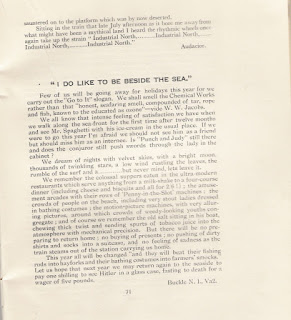In the introduction to I Think I Prefer the Tinned Variety: The Diary of a Petty Officer in the Fleet Air Arm during World War II I explained that when I started researching my dad's story I paid for a copy of his records from the Royal Navy Archives but these gave incomplete details of his service. Then my sister discovered in her loft a folder containing the original documents that were his Fleet Air Arm records: they detailed in chronological order where he'd been and what his job was. There were other documents that added further to his story. Amongst these other documents were copies of his school magazine and in the Summer Term 1940 (the year he left school) it included this contribution from him:
I DO LIKE TO BE BESIDE THE SEASIDE
"Few of us will be going away for holidays this year for we carry out the "Go to It" slogan. We shall smell the Chemical Works rather than that "honest, seafaring smell compounded of tar, rope and fish, known to the educated as ozone" - (W.W. Jacobs)
We all know that intense feeling of satisfaction we have when we walk along the sea-front for the first time after twelve months and see Mr Spaghetti with his ice-cream in the usual place. If we were to go this year I'm afraid we should not see him as a friend but should miss him as an internee. Is "Punch and Judy" still there and does the conjuror still push swords through the lady in the cabinet?
We dream of nights with velvet skies, with a bright moon, thousands of twinkling stars, a low wind rustling the leaves, the rumble of the surf and a …….but never mind, lets leave it.
We remember the colossal suppers eaten in the ultra-modern restaurants which serve anything from a milk-shake to a four course dinner (including cheese and biscuits and all for 2/6!); the amusement arcades with their rows of 'Penny-in-the-Slot' machines; the crowds of people on the beach, including very stout ladies dressed in bathing costumes; the motion-picture machines, with very alluring pictures, around which crowds of weedy looking youths congregate; and of course we remember the old salt sitting in his boat, chewing thick twist and sending spurts of tobacco juice into the atmosphere with mechanical precision. But there will be no preparing to return home; no buying of presents; no pushing of dirty shirts and socks into a suitcase, and no feeling of sadness as the train steams out of the station carrying us home.
The "Go to It" slogan was used for those who were involved in the war effort on the home front and is well described in this extract from the blurb for Asa Briggs' book of the same title:
"Two British forces played a part in the Allied victory in the Second World War. The contribution of the army, navy and RAF is well understood and appreciated. Less well known, but of equal significance, are the endeavours of those involved in the war effort at home. Looking back at the twentieth century from the vantage point of the new millennium, "Go To It!" is the story of the everyday heroes and heroines who, through their determination and commitment, and despite many sacrifices, made victory in Europe possible. Starting with the recruitment and enrolment of these 'civilian soldiers', "Go To It!" looks at the areas in which their efforts were invaluable: in the factories and on the production lines; in the fields; in the coalmines; and in the dockyards. Special attention is paid to the huge role played by women, the young and old, and those who came from other countries and continents to offer their help."
I haven't been able to find out what my dad worked at after he left school until he started a job in the Council Offices in October 1940. I can't imagine a long, extended summer holiday was an option at that time though.
The quote from W.W. Jacobs at the start of his piece is from a book entitled "At Sunwich Port" written in 1902. If you're interested in this book you can view it on Project Gutenberg; follow this link: http://www.gutenberg.org/files/10876/10876-h/10876-h.htm The illustrations are fantastic. You can get the book as a free download for your Kindle but it doesn't have the illustrations in it.
To read more of I Think I Prefer the Tinned Variety: The Diary of a Petty Officer in the Fleet Air Arm during World War II follow one of these links:
http://www.amazon.co.uk/dp/B009QXEUG2
http://www.amazon.com/dp/B009QXEUG2


Comments
Post a Comment
If you have something to add to the story please feel free to write your comment here.